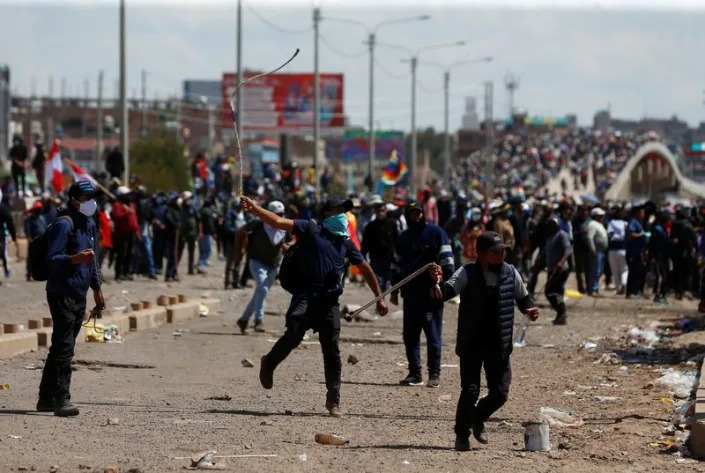
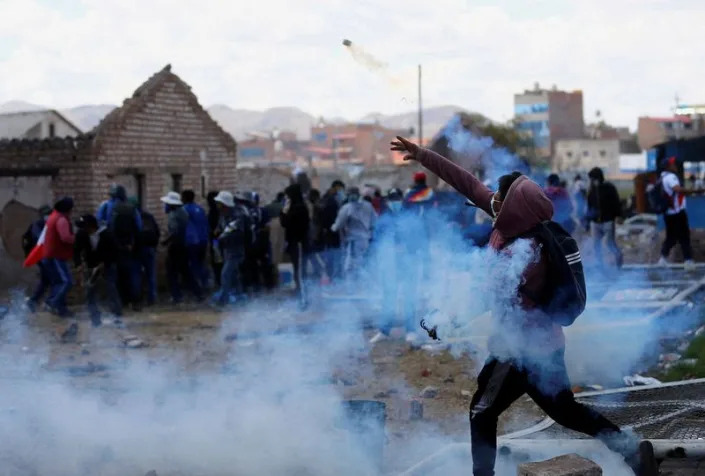
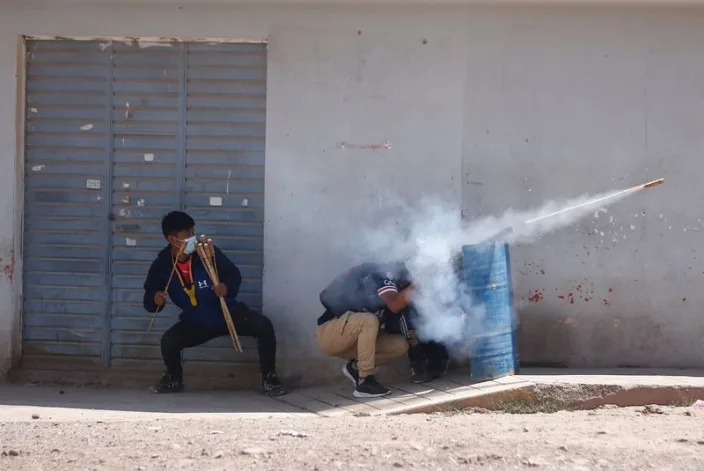
Demonstrators clash with security forces in Juliaca
Thu, January 12, 2023
By Brendan O'Boyle
(Reuters) - At least 40 people have died in clashes between Peruvian security forces and protesters in the Andean country's worst outbreak of violence in over 20 years, as demonstrators call for systemic political changes and accountability for the deaths.
WHAT SPARKED THE PROTESTS?
Protests began after Congress removed President Pedro Castillo on Dec. 7, who was arrested and sentenced to 18 months of pre-trial detention on rebellion charges.
Castillo, 53, was embroiled in multiple corruption investigations and tried to illegally dissolve Congress ahead of a planned impeachment vote.
His removal was the latest blow in a years-long clash between Peru's executive and legislature. Castillo's vice president, Dina Boluarte, ascended to the job as Peru's sixth president in five years.
WHAT IS FUELING THE PROTESTS?
Protesters are demanding Boluarte's resignation, Congress' closure, a new constitution and Castillo's release. There have also been marches calling for an end to the unrest.
Allegations of undue force against protesters have fueled anger against Boluarte's government. Human rights groups have accused authorities of using firearms on protesters and dropping smoke bombs from helicopters. The army says protesters have used weapons and homemade explosives.
Peru's top prosecutor's office on Jan. 10 said it launched an inquiry into Boluarte and members of her cabinet on charges of "genocide, qualified homicide and serious injuries" amid the protests.
WHAT IS HAPPENING AT PROTESTS?
Protesters have blockaded highways, set buildings on fire, and invaded airports, causing tens of millions of dollars in damage and lost revenue. Blockades have disrupted trade, grounded flights and stranded tourists.
Security forces have responded with violence. Victims have included civilians who were not protesting.
The Inter-American Commission on Human Rights has condemned violence by both security forces and protesters and called for dialogue. Protesters have so far refused to start talks with Boluarte.
WHO IS PEDRO CASTILLO?
Voters elected Castillo, a socialist, from a crowded field of candidates in 2021, following years of political crises and during a pandemic that hit Peru harder than most countries.
A little-known teacher and union leader from a poor Andean village, Castillo had no experience in elected office or ties to the Lima establishment.
Castillo's supporters had high hopes he could bring better representation to poor, rural and indigenous Peruvians while standing up to elites.
Once in office, however, his support tumbled amid corruption scandals, party infighting, and congressional opposition. Castillo struggled to govern, naming five prime ministers and more than 80 ministers during his short presidency.
Still, Castillo retained supporters, who see him as a victim of political elites and a Congress that is widely unpopular and considered corrupt. Castillo's 27% approval rating in a November IPSOS poll was still higher than Congress' 18%.
WHERE ARE THE PROTESTS?
Protests have occurred nationwide, but Peru's long marginalized, left-leaning south has been their epicenter and the site of the worst violence.
The largely indigenous region has for centuries been at odds with the more mestizo and whiter capital, which long dominated national politics. Castillo was just the second president born outside of Lima to be elected since 1956.
Although poverty fell in recent decades, a gap in living standards persists between the region and the capital. Despite local copper and gas wealth in the south, indicators including life expectancy and infant mortality lag those in Lima.
Peru's south is also home to economically and culturally important tourist destinations such as Cusco and the nearby Inca citadel of Machu Picchu, from where over 2,000 tourists had to be evacuated in early January due to protests.
(Reporting by Brendan O'Boyle and Marco Aquino; Editing by Lincoln Feast.)
Peru families mourn protest dead after worst violence in decades
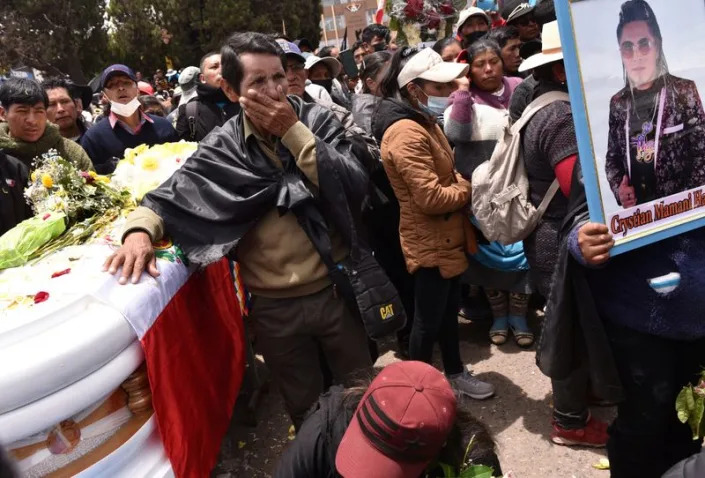
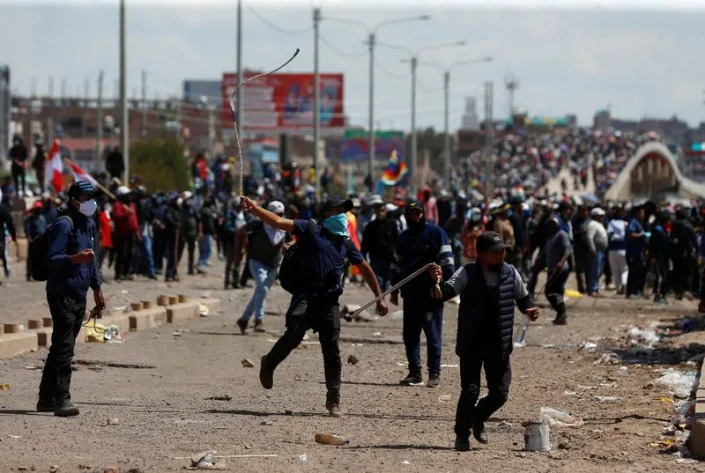
Demonstrators clash with security forces in Juliaca
Marco Aquino
Wed, January 11, 2023
By Marco Aquino
LIMA (Reuters) -Peruvians in the southern region of Puno carried coffins through the streets on Wednesday of the 17 civilians who died in protests in the area earlier this week, the worst outbreak of violence the Andean country has seen in over 20 years.
Even as families mourned their dead, the country's ombudsman reported another death in clashes in the Andean city of Cusco, that of local community leader Remo Candia Guevara.
"We demand an immediate investigation to find those responsible for the death and proceed to the respective sanctions," it said in a statement.
The country has been roiled by protests since the abrupt ouster of leftist President Pedro Castillo in early December, with a total of 41 people killed, almost half of them in the city of Juliaca on Monday, including one police officer.
Thousands of people in Juliaca paid tribute to the dead by carrying coffins through the streets before their burial along with photos of the faces of the victims, flowers, Peruvian flags, and banners blaming the new government for the violence.
"The bloodshed will never be forgotten," some shouted while carrying black flags at a march in the region that borders Bolivia and was the focus of the most recent protests.
The violence, a severe test for Peru's democracy, is the worst conflict since the late 1990s when the country was gripped by violence between rebel group Shining Path and the state, which left 69,000 people dead or missing over two decades.
Protests in 2009 saw 33 Peruvians killed after indigenous groups in the northern jungle region clashed with police during the government of former President Alan García.
Protesters are calling for the resignation of new President Dina Boluarte, quick general elections, a new Constitution and the release of Castillo, who was ousted and arrested for "rebellion" after trying to illegally shutter Congress.
'LISTENING TO ALL VOICES'
On Wednesday a mission from the Inter-American Commission on Human Rights (IACHR) met Boluarte, whose Cabinet survived a confidence vote by Congress on Tuesday, to assess the crisis.
"We will be verifying the human rights situation, the idea is to hear from the broadest possible range of all voices," IACHR representative Edgar Stuardo Ralón told reporters.
Boluarte, facing a preliminary investigation by state prosecutors over the deaths, said in a statement after the meeting that the government would give the commission all the support needed to find out what had happened.
Peruvian police and armed forces have been accused by human rights groups of using deadly firearms and launching tear gas canisters from helicopters. The army says, for its part, that the demonstrators have used weapons and homemade explosives.
(Reporting by Marco Aquino; Editing by Sandra Maler)
Peru protests: New President Boluarte faces genocide inquiry
Tue, January 10, 2023

Dina Boluarte was sworn in as Peru's new president shortly after Pedro Castillo was ousted
Peru's top prosecutor has launched an inquiry into President Dina Boluarte and key ministers over weeks of clashes that have left dozens of people dead.
The officials are being investigated on charges of "genocide, qualified homicide and serious injuries".
Violence erupted after ex-President Pedro Castillo was arrested in December for trying to dissolve Congress.
On Monday, 17 people died in clashes between Castillo supporters and security forces in south-eastern Peru.
Dozens more were injured in the city of Juliaca in what was the worst day of violence so far. Many of the victims had gunshot wounds.
The authorities accused the protesters of trying to overrun Juliaca's airport and a local police station. An overnight curfew is now in place in the region.
Fresh Peru clashes leave many dead
On Tuesday, the attorney general's office announced its decision to investigate Ms Boluarte, as well as Prime Minister Alberto Otárola along with the defence and interior ministers.
The president and her ministers have not publicly commented on the issue.
Castillo supporters - many of whom are poor indigenous Peruvians - say President Boluarte must resign, snap elections be held and the former president released.
Mr Castillo, a left-winger, tweeted from his prison cell, saying those defending Peru from what he called the coup dictatorship would never be forgotten.
In a separate development on Tuesday, Mr Otárola's government comfortably won a vote of confidence in Congress.
The South American nation has been through years of political turmoil, with the latest crisis coming to a head when Mr Castillo announced he was dissolving Congress and introducing a state of emergency in December.
But Congress proceeded to vote overwhelmingly to impeach him.
The former president is being investigated on charges of rebellion and conspiracy. He denies all the accusations, insisting that he is still the country's legitimate president.
No comments:
Post a Comment